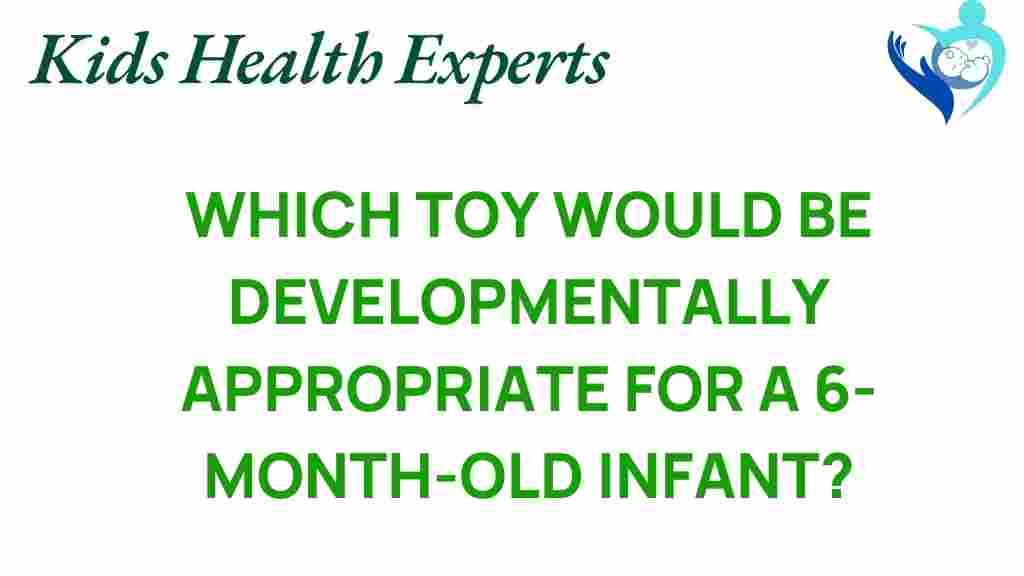Discover the Ideal Toys for Your 6-Month-Old: A Parent’s Guide
As parents, it’s essential to support our little ones through every stage of their growth and development. At six months old, infants are rapidly exploring the world around them and reaching important developmental milestones. Choosing the right toys for babies can significantly aid in their infant development and provide them with engaging experiences. In this guide, we will explore the best toys for your 6-month-old, focusing on how they can foster child growth, encourage early learning, and make for effective sensory play.
Understanding Infant Development at 6 Months
By the time your baby reaches six months, they are undergoing remarkable changes. They are likely starting to sit up, reaching for objects, and may even begin to crawl. During this period, your baby will hit several developmental milestones, including:
- Improved hand-eye coordination
- Increased curiosity about their surroundings
- Enhanced ability to grasp and manipulate objects
- Vocalizations and sounds
To support these milestones, providing appropriate baby toys is crucial. The right toys can help stimulate their senses and encourage exploration, which is vital for their growth.
Choosing the Right Toys for Your Baby
When selecting engaging playthings for your baby, consider the following categories:
- Interactive Toys: Toys that respond to your baby’s actions encourage cause and effect understanding.
- Textured Toys: Toys with varying textures promote tactile exploration.
- Musical Toys: Instruments or toys that make sounds stimulate auditory senses.
- Stacking and Sorting Toys: These enhance fine motor skills and cognitive development.
Top Toys for Your 6-Month-Old
Here are some excellent toys for babies that cater to various aspects of infant development:
- Soft Blocks: These are great for stacking and knocking down, promoting fine motor skills and hand-eye coordination.
- Rattles: A classic choice, rattles not only entertain but also help babies learn how to grasp and shake.
- Play Gyms: These provide sensory play opportunities with hanging toys that your baby can reach for and bat at.
- Musical Toys: Toys that play music or have buttons to push can enhance auditory skills and encourage movement.
- Teething Toys: These soothe sore gums and are perfect for babies who are starting to teeth.
The Importance of Sensory Play
Sensory play is vital for infants as it helps them explore their environment and develop their senses. Here are some sensory toys to consider:
- Textured Balls: These promote tactile exploration and are easy for little hands to grasp.
- Water Play Toys: Bath toys can provide sensory experiences during bath time.
- Light-Up Toys: Toys that light up can engage visual senses and stimulate curiosity.
Encouraging Early Learning Through Play
Play is not just fun; it’s a vital part of early learning. Here are some tips to enhance your baby’s learning experience:
- Interactive Play: Engage with your baby using the toys. Show them how to use the toys and make sounds together.
- Routine Playtime: Establish a consistent playtime to help your baby anticipate and enjoy these moments.
- Variety is Key: Rotate toys to keep your baby interested and encourage exploration of different skills.
Step-by-Step Guide to Engaging Playtime
Here’s a simple step-by-step process to create an engaging playtime for your 6-month-old:
- Set Up a Safe Play Area: Ensure the area is free of hazards and has a soft surface for your baby to explore.
- Select a Variety of Toys: Choose a mix of toys from the categories mentioned above.
- Engage Your Baby: Sit with your baby and introduce the toys, demonstrating how they work.
- Encourage Exploration: Allow your baby to explore the toys at their own pace, offering support when needed.
- Incorporate Movement: Encourage your baby to reach, crawl, or roll to promote physical development.
Troubleshooting Tips for Playtime
Sometimes, playtime may not go as planned. Here are some troubleshooting tips:
- Baby Seems Disinterested: Try rotating toys or introducing a new activity to rekindle interest.
- Frustration with Toys: Ensure the toys are age-appropriate and easy for your baby to handle.
- Too Many Distractions: Remove unnecessary items from the play area to help your baby focus.
Conclusion
Choosing the right toys for babies is crucial in supporting their infant development and achieving developmental milestones. By focusing on engaging playthings that stimulate their senses, you can encourage child growth and early learning during this exciting stage of life. Remember to engage with your baby during playtime, as your interaction is just as important as the toys themselves. For more parenting tips, visit our parenting resources page.
As you navigate through this journey, remember that every baby is different. Be patient, observe your child’s preferences, and most importantly, enjoy the playtime together! For more information on child development, you can refer to this external resource which offers in-depth insights into infant growth and learning.
This article is in the category Growth and created by KidsHealthExperts Team
